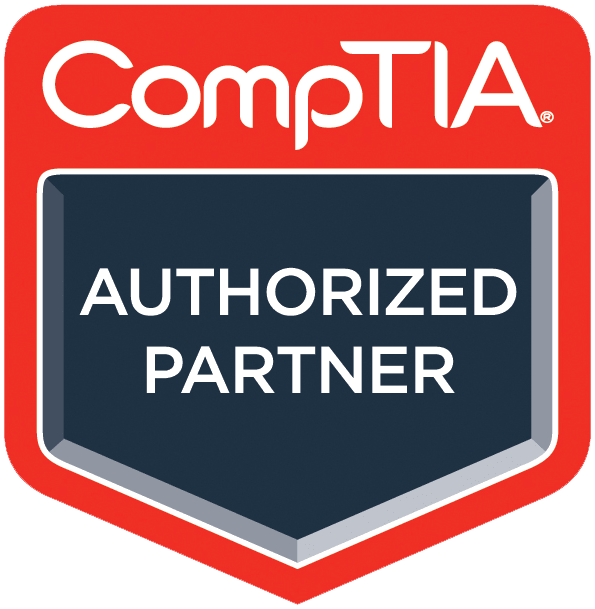Certified Ethical Hacker
CEHv12 Exam Prep
with
with
About the Program
This online program includes training for the EC-Council Certified Ethical Hacker (CEHv12) and CompTIA Security+ exams. The courses are designed to prepare you for a successful career in cybersecurity.
EC-Council Certified Ethical Hacker (CEHv12)
The Certified Ethical Hacker certification is one of the most sought-after cybersecurity certifications around the globe. Organizations like the DoD and ANSI have endorsed and/or accredited the CEH course.
What is a Certified Ethical Hacker? A Certified Ethical Hacker is a specialist typically working in a red team environment, focused on attacking computer systems and gaining access to networks, applications, databases, and other critical data on secured systems. A C|EH® understands attack strategies, the use of creative attack vectors, and mimics the skills and creativity of malicious hackers. Unlike malicious hackers and actors, Certified Ethical Hackers operate with permission from the system owners and take all precautions to ensure the outcomes remain confidential. Bug bounty researchers are expert ethical hackers who use their attack skills to uncover vulnerabilities in the systems.
-
The C|EH® v12 is a specialized and one-of-a-kind training program to teach you everything you need to know about ethical hacking with hands-on training, labs, assessment, a mock engagement (practice), and global hacking competition. Stay on top of the game with the most in-demand skills required to succeed in the field of cybersecurity.
Currently in its 12th version, C|EH is a very well-known certification in the cybersecurity space. A simple search for global job ads on LinkedIn (as of August 2022) shows over 32,000 available jobs requesting candidates with a C|EH Certification representing over 72% market share in job ads placed by employers combined across Career Builder, LinkedIn, Dice, Indeed, Monster, and Naukri, while being compared to other certifications like SANS GPEN, OSCP, and Pentest+.
The C|EH® v12 training program includes 20 modules covering various technologies, tactics, and procedures, providing prospective ethical hackers with the core knowledge needed to thrive in cybersecurity. Delivered through a carefully curated training plan that typically spans five days, the 12th version of the C|EH® continues to evolve to keep up with the latest OS, exploits, tools, and techniques. The concepts covered in the training program are split 50/50 between knowledge-based training and hands-on application through our cyber range.Every tactic discussed in training is backed by step-by-step labs conducted in a virtualized environment with live targets, live tools, and vulnerable systems. Through our lab technology, every participant will have comprehensive hands-on practice to learn and apply their knowledge.
-
Mid-Level Information Security Auditor
Cybersecurity Auditor
Security Administrator
IT Security Administrator
Cyber Defense Analyst
Vulnerability Assessment Analyst
Warning Analyst
Information Security Analyst 1
Security Analyst L1
Infosec Security Administrator
Cybersecurity Analyst level 1, level 2, & level 3
Network Security Engineer
SOC Security Analyst
Security Analyst
Network Engineer
Senior Security Consultant
Information Security Manager
Senior SOC Analyst
Solution Architect
Cybersecurity Consultant
-
The C|EH exam is a 4-hour exam with 125 multiple-choice questions. This knowledge-based exam will test your skills in Information Security Threats and Attack Vectors, Attack Detection, Attack Prevention, Procedures, Methodologies and more.
C|EH® (ANSI)
Exam Title: Certified Ethical Hacker (ANSI)
Exam Code: 312-50 (ECC EXAM), 312-50 (VUE)
Number of Questions: 125
Duration: 4 hours
Availability: ECCEXAM/VUE
Test Format: Multiple Choice
Passing Score: Please refer to
https://cert.eccouncil.org/faq.html
C|EH® (Practical)
Exam Title: Certified Ethical Hacker (Practical)
Number of Practical Challenges: 20
Duration: 6 hours
Availability: ASPEN iLabs
Test Format: iLabs cyber range
Passing Score: 70%
CompTIA Security+
CompTIA Security+ is a global certification that validates the baseline skills necessary to perform core security functions and pursue an IT security career. Security+ opens the door to your cybersecurity career!
-
Why is Security+ different?
More choose Security+ - chosen by more corporations and defense organizations than any other certification on the market to validate baseline security skills and for fulfilling the DoD 8570 compliance.
Security+ proves hands-on skills – the only baseline cybersecurity certification emphasizing hands-on practical skills, ensuring the security professional is better prepared to problem solve a wider variety of today’s complex issues.
More job roles turn to Security+ to supplement skills – baseline cybersecurity skills are applicable across more of today’s job roles to secure systems, software and hardware.
Security+ is aligned to the latest trends and techniques – covering the most core technical skills in risk assessment and management, incident response, forensics, enterprise networks, hybrid/cloud operations, and security controls, ensuring high-performance on the job.
What Skills Will You Learn?
Attacks, Threats and Vulnerabilities- Focusing on more threats, attacks, and vulnerabilities on the Internet from newer custom devices that must be mitigated, such as IoT and embedded devices, newer DDoS attacks, and social engineering attacks based on current events.
Operations and Incident Response- Covering organizational security assessment and incident response procedures, such as basic threat detection, risk mitigation techniques, security controls, and basic digital forensics.
Architecture and Design - Includes coverage of enterprise environments and reliance on the cloud, which is growing quickly as organizations transition to hybrid networks.
Governance, Risk and Compliance- Expanded to support organizational risk management and compliance to regulations, such as PCI-DSS, SOX, HIPAA, GDPR, FISMA, NIST, and CCPA.
Implementation- Expanded to focus on administering identity, access management, PKI, basic cryptography, wireless, and end-to-end security.
-
Security Administrator
Systems Administrator
Helpdesk Manager / Analyst
Network / Cloud Engineer
Security Engineer / Analyst
DevOps / Software Developer
IT Auditors
IT Project Manager
-
CompTIA Security+ is the first security certification a candidate should earn. It establishes the core knowledge required of any cybersecurity role and provides a springboard to intermediate-level cybersecurity jobs. Security+ incorporates best practices in hands-on troubleshooting, ensuring candidates have practical security problem-solving skills required to:
Assess the security posture of an enterprise environment and recommend and implement appropriate security solutions
Monitor and secure hybrid environments, including cloud, mobile, and IoT
Operate with an awareness of applicable laws and policies, including principles of governance, risk, and compliance
Identify, analyze, and respond to security events and incidents
Security+ is compliant with ISO 17024 standards and approved by the US DoD to meet directive 8140/8570.01-M requirements. Regulators and government rely on ANSI accreditation, because it provides confidence and trust in the outputs of an accredited program. Over 2.3 million CompTIA ISO/ANSI-accredited exams have been delivered since January 1, 2011.
Maximum of 90 questions
Multiple choice and performance-based questions
90 minutes
Passing Score: 750 (on a scale of 100-900)
Tuition & Program Info
To learn more about ETI’s tuition and financial aid options, click here.
$3,997
This is a self-paced program. Self-paced programs create a unique learning experience that allows students to learn independently and at a pace that best suits them.
Duration: 16 Weeks
Students have full online access to the program for 1 year.
Exam Vouchers are Included with Tuition
Program Includes:
CompTIA Security+
Virtual practice labs
Practice exam questions
Mentor support
EC-Council CEHv12
Official e-courseware (1 year access)
CyberQ Labs (6 Months Access)
Exam Prep (online)
E-book
Exam voucher
CodeRed 12-month Subscription ($499 additional cost)
4000+ Premium Videos
New courses and content added weekly
Courses contain an abundance of demo lab videos that dive deeper into important cyber concepts
Course Breakdown
-
Mentoring Security+
TestPrep Security+ SY0-601: used to test your knowledge on the skills and competencies being measured by the vendor certification exam. TestPrep can be taken in either Study or Certification mode. Study mode is designed to maximize learning while certification mode is designed to test your knowledge of the material within a structured testing environment, providing valuable feedback at the end of the test.
The Present Threat Landscape
Types of Malware
Social Engineering and Related Attacks
Application and Service Attacks
Cryptographic and Wireless Attacks
Penetration Testing and Vulnerability Scanning
Impacts from Vulnerability Types
Components Supporting Organizational Security
Security Assessment Using Software Tools
Cryptography
Public Key Infrastructure
Wireless Security Settings
Analyzing Output from Security Technologies
Deploying Mobile Devices Securely
Implementing Secure Protocols
Troubleshooting Common Security Issues
Identity Concepts and Access Services
Identity and Access Management Controls
Common Account Management Practices
Frameworks, Guidelines, and Physical Security
Implement Secure Network Architecture Concepts
Secure System and Application Design and Deployment
Cloud, Virtualization, and Resiliency Concepts
Policies, Plans, and Procedures
Business Impact Analysis and Risk Management
Incident Response, Forensics, and Disaster Recovery
-
Module 1: Introduction to Ethical Hacking
Cover the fundamentals of key issues in the information security world, including the basics of ethical hacking, information security controls, relevant laws, and standard procedures.
Module 2: Foot Printing and Reconnaissance
Learn how to use the latest techniques and tools to perform foot printing and reconnaissance, a critical pre-attack phase of the ethical hacking process.
Module 3: Scanning Networks
Learn different network scanning techniques and countermeasures.
Module 4: Enumeration
Learn various enumeration techniques, such as Border Gateway Protocol (BGP) and Network File Sharing (NFS) exploits, and associated countermeasures.
Module 5: Vulnerability Analysis
Learn how to identify security loopholes in a target organization’s network, communication infrastructure, and end systems. Different types of vulnerability assessment and vulnerability assessment tools.
Module 6: System Hacking
Learn about the various system hacking methodologies—including steganography, steganalysis attacks, and covering tracks—used to discover system and network vulnerabilities.
Module 7: Malware Threats
Learn different types of malware (Trojan, virus, worms, etc.), APT and fileless malware, malware analysis procedure, and malware countermeasures.
Module 8: Sniffing
Learn about packet-sniffing techniques and how to use them to discover network vulnerabilities, as well as countermeasures to defend against sniffing attacks.
Module 9: Social Engineering
Learn social engineering concepts and techniques, including how to identify theft attempts, audit human-level vulnerabilities, and suggest social engineering countermeasures.
Module 10: Denial-of-Service
Learn about different Denial of Service (DoS) and Distributed DoS (DDoS) attack techniques, as well as the tools used to audit a target and devise DoS and DDoS countermeasures and protections.
Module 11: Session Hijacking
Understand the various session hijacking techniques used to discover network-level session management, authentication, authorization, and cryptographic weaknesses and associated countermeasures.
Module 12: Evading IDS, Firewalls, and Honeypots
Get introduced to firewall, intrusion detection system (IDS), and honeypot evasion techniques; the tools used to audit a network perimeter for weaknesses; and countermeasures.
Module 13: Hacking Web Servers
Learn about web server attacks, including a comprehensive attack methodology used to audit vulnerabilities in web server infrastructures and countermeasures.
Module 14: Hacking Web Applications
Learn about web application attacks, including a comprehensive web application hacking methodology used to audit vulnerabilities in web applications and countermeasures.
Module 15: SQL Injection
Learn about SQL injection attacks, evasion techniques, and SQL injection countermeasures.
Module 16: Hacking Wireless Networks
Understand different types of wireless technologies, including encryption, threats, hacking methodologies, hacking tools, Wi-Fi security tools, and countermeasures.
Module 17: Hacking Mobile Platforms
Learn Mobile platform attack vector, android and iOS hacking, mobile device management, mobile security guidelines, and security tools.
Module 18: IoT and OT Hacking
Learn different types of IoT and OT attacks, hacking methodology, hacking tools, and countermeasures.
Module 19: Cloud Computing
Learn different cloud computing concepts, such as container technologies and server less computing, various cloud computing threats, attacks, hacking methodology, and cloud security techniques and tools.
Module 20: Cryptography
Learn about encryption algorithms, cryptography tools, Public Key Infrastructure (PKI), email encryption, disk encryption, cryptography attacks, and cryptanalysis tools.






